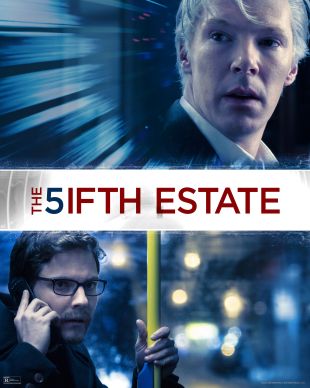
From news reports, it would seem that there are few people as influential, infamous, and unknowable as /WikiLeaks founder Julian Assange. Director Bill Condon's biopic of Assange, The Fifth Estate, depicts how he became one of the most feared, despised, and -- in some quarters -- lionized figures in the fight for free speech in the digital age, but it doesn't bring us any closer to what makes him tick.
Opening with a sharply constructed montage that gives us the history of mass communications from cave paintings to the Internet, the movie wastes little time establishing how Assange (played by Benedict Cumberbatch) created /WikiLeaks, a website where whistle-blowers could share information so secretly that even Assange himself had no way of knowing who the source was. He enlists the help of fellow tech whiz Daniel Domscheit-Berg (Daniel Brühl) as his trusted lieutenant, though Daniel quickly learns that his egotistical, ambitious, and ceaselessly self-righteous boss requires his attention at every waking moment.

The site becomes more popular after they publish stories that bring down a major bank, leading to the arrival of a massive number of secret government memos that, if exposed, would bring to light the realities of how the War on Terror is being fought by America and its allies. While Daniel encourages Julian to work with established news sources -- personified by London Times reporter Nick Davies (David Thewlis) -- to bring this sensitive material to the public, officials in the U.S. State Department (Laura Linney and Stanley Tucci) attempt to neutralize Assange and the damage that airing this info would do to their ongoing efforts.
An equal mix of All the President's Men and The Social Network, The Fifth Estate doesn't lack for ambition. Condon understands that this is a complicated story that consists primarily of people typing on their computers. He does his best to make such static imagery interesting, and comes up with an intriguing and humorous visual conceit that drives home how small the /WikiLeaks operation actually is; except for the obligatory scenes of domestic squabbling between Daniel and his neglected girlfriend, the movie feels like it's moving forward even when not much is actually happening within the narrative.
Cumberbatch is appropriately mysterious as Assange: He plays him as a man who isn't so much charismatic as he is compelling. His messianic zeal when it comes to changing the world slowly reveals itself to be as ego-driven as it is selfless. The movie's best moment comes right at the very end as Assange, holed up in Ecuador's embassy in Britain, gives an interview that reveals -- with a little aside he can't help himself from making -- how much he wants credit for what he's done.
It's a savvy performance, but this element of the script -- the biographical focus on Assange -- is the least developed and least interesting. As a movie character, he doesn't change over the course of the film, even as Daniel does evolve. The picture works on the whole because it expertly and entertainingly lays out exactly how this complicated international brouhaha transpired, and how these events led to Daniel's disillusionment with his employer (the movie is based in part on his memoir of his time with Assange -- and Assange himself has gone on record regarding his negative feelings about The Fifth Estate). Because Condon and screenwriter Josh Singer make the mistake of focusing their movie's emotional arc on someone who isn't their most interesting character, The Fifth Estate doesn't grip us as forcefully as it feels like it should.
However, when the third act kicks in and Assange and company have to figure out how to deal with the highly classified documents in their possession, the movie is at its best. It makes an intricate web of deception, fear, and betrayal quite easy to understand, with Linney providing gravitas and Tucci on hand for some welcome, if brief, comic relief. As the characters debate the ethics of what should be done, Singer lets them articulate the big questions at the heart of the picture.
The Fifth Estate is far from the definitive portrait of Assange and his accomplishments, in part because it doesn't answer the questions it so fascinatingly poses. It lacks the psychological insight of David Fincher's biopic of Mark Zuckerberg, as well as the weight of history and the palpable paranoia of Alan J. Pakula's recreation of the Watergate investigations. Yet it does possess the unmistakable buzz of topicality that makes it feel like more than just a solidly made, well-acted docudrama.
